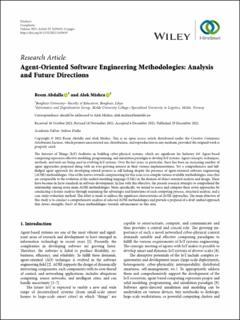| dc.description.abstract | The Internet of Things (IoT) facilitates in building cyber-physical systems, which are significant for Industry 4.0. Agent-based computing represents effective modeling, programming, and simulation paradigm to develop IoT systems. Agent concepts, techniques, methods, and tools are being used in evolving IoT systems. Over the last years, in particular, there has been an increasing number of agent approaches proposed along with an ever-growing interest in their various implementations. Yet a comprehensive and full-fledged agent approach for developing related projects is still lacking despite the presence of agent-oriented software engineering (AOSE) methodologies. One of the moves towards compensating for this issue is to compile various available methodologies, ones that are comparable to the evolution of the unified modeling language (UML) in the domain of object-oriented analysis and design. These have become de facto standards in software development. In line with this objective, the present research attempts to comprehend the relationship among seven main AOSE methodologies. More specifically, we intend to assess and compare these seven approaches by conducting a feature analysis through examining the advantages and limitations of each competing process, structural analysis, and a case study evaluation method. This effort is made to address the significant characteristics of AOSE approaches. The main objective of this study is to conduct a comprehensive analysis of selected AOSE methodologies and provide a proposal of a draft unified approach that drives strengths (best) of these methodologies towards advancement in this area. | en_US |

